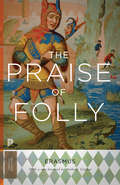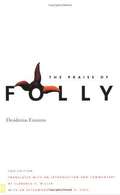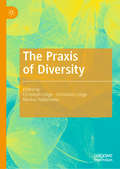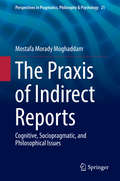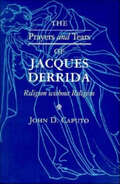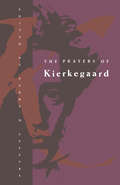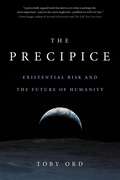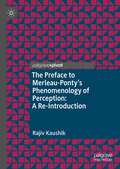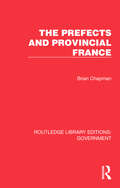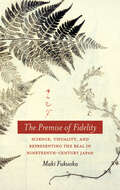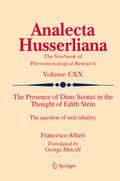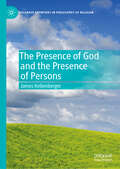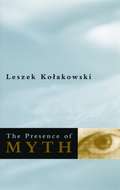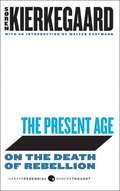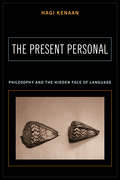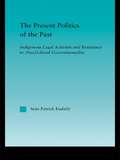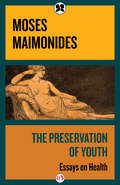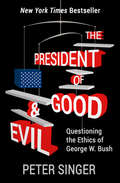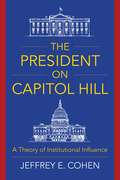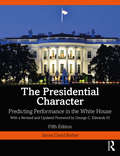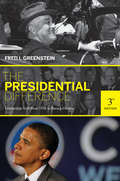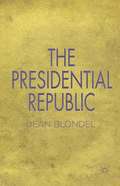- Table View
- List View
The Praise of Folly
by Anthony Grafton Desiderius ErasmusDesiderius Erasmus (1466-1536) was a Dutch humanist, scholar, and social critic, and one of the most important figures of the Renaissance. The Praise of Folly is perhaps his best-known work. Originally written to amuse his friend Sir Thomas More, this satiric celebration of pleasure, youth, and intoxication irreverently pokes fun at the pieties of theologians and the foibles that make us all human, while ultimately reaffirming the value of Christian ideals. No other book displays quite so completely the transition from the medieval to the modern world, and Erasmus's wit, wisdom, and critical spirit have lost none of their timeliness today.This Princeton Classics edition of The Praise of Folly features a new foreword by Anthony Grafton that provides an essential introduction to this iridescent and enduring masterpiece.
The Praise of Folly (Yale Nota Bene)
by Desiderius ErasmusThe Praise of Folly has enjoyed enormous and highly controversial success from the author’s lifetime down to our own day.It has no rival, except perhaps Thomas More’s Utopia, as the most intense and lively presentation of the literary, social, and theological aims and methods of Northern Humanism.
The Praxis of Diversity
by Christiane Lütge Christoph Lütge Markus FaltermeierThis edited collection brings together experts from various disciplines to engage critically with diversity theory, diversity politics, and their practical application. Accordingly, the volume provides a provocative discursive space, where the key theoretical as well as practical problems of diversity in business, institutions and culture can speak to each other and can be assessed. The aim is to bridge the gap between two relatively distinct discourses: the discourse on practical applications of diversity concepts and the discourse on theoretical approaches to diversity. This selection of articles delivers the first step towards achieving this goal. Approaching diversity from a business perspective, the chapters discuss its ramifications on democratic institutions and theory, as well as point to its relevance in didactic and educational settings.
The Praxis of Indirect Reports: Cognitive, Sociopragmatic, and Philosophical Issues (Perspectives in Pragmatics, Philosophy & Psychology #21)
by Mostafa Morady MoghaddamThis book discusses the concept of indirect reporting in relation to sociopragmatic, philosophical, and cognitive factors. In addition, it deals with several state-of-the-art topics with regard to indirect reports, such as trust, politeness, refinery and photosynthetic processes and cognitive features. The book presents socio-cognitive accounts of indirect reports that take into consideration Grice’s Cooperation Principle and Sperber and Wilson’s Relevance Theory. It discusses direct and indirect reports and their similarities and differences, with a focus on the neglected role of the hearer in indirect reports. It presents an extensive comparison of translation and indirect reports (with a detailed discussion on reporting/translating slurring), and examines politeness issues and the role of trust. It deals with the main principles governing the use and interpretation of indirect reports (among them, the Principle of Commitment and the Principle of Immunity). Finally, the book discusses the idea of ‘common core’ and cross-cultural studies in reported speech and illustrates by means of an analysis of Persian reported speech, how subjectivity and uncertainty are presented among Persian speakers.
The Prayers and Tears of Jacques Derrida: Religion without Religion (Indiana Series in the Philosophy of Religion Ser.)
by John D. Caputo"Caputo's book is riveting. . . . A singular achievement of stylistic brio and impeccable scholarship, it breaks new ground in making a powerful case for treating Derrida as homo religiosis. . . . There can be no mistaking the importance of Caputo's work." —Edith Wyschogrod"No one interested in Derrida, in Caputo, or in the larger question of postmodernism and religion can afford to ignore this pathbreaking study. Taking full advantage of the most recent and least discussed writings of Derrida, it offers a careful and comprehensive account of the religious dimension of Derrida's thought." —Merold Westphal
The Prayers of Kierkegaard (Phoenix Bks.)
by Perry D. LefevreSoren Kierkegaard's influence has been felt in many areas of human thought from theology to psychology. The nearly one hundred of his prayers gathered here from published works and private papers, not only illuminate his own life of prayer, but speak to the concerns of Christians today. The second part of the volume is a reinterpretation of the life and thought of Kierkegaard. Long regarded as primarily a poet or a philosopher, Kierkegaard is revealed as a fundamentally religious thinker whose central problem was that of becoming a Christian, of realizing personal existence. Perry D. LeFevre's penetrating analysis takes the reader to the religious center of Kierkegaard's world.
The Precipice: Existential Risk and the Future of Humanity
by Toby OrdThis urgent and eye-opening book makes the case that protecting humanity's future is the central challenge of our time. If all goes well, human history is just beginning. Our species could survive for billions of years - enough time to end disease, poverty, and injustice, and to flourish in ways unimaginable today. But this vast future is at risk. With the advent of nuclear weapons, humanity entered a new age, where we face existential catastrophes - those from which we could never come back. Since then, these dangers have only multiplied, from climate change to engineered pathogens and artificial intelligence. If we do not act fast to reach a place of safety, it will soon be too late. Drawing on over a decade of research, The Precipice explores the cutting-edge science behind the risks we face. It puts them in the context of the greater story of humanity: showing how ending these risks is among the most pressing moral issues of our time. And it points the way forward, to the actions and strategies that can safeguard humanity. An Oxford philosopher committed to putting ideas into action, Toby Ord has advised the US National Intelligence Council, the UK Prime Minister's Office, and the World Bank on the biggest questions facing humanity. In The Precipice, he offers a startling reassessment of human history, the future we are failing to protect, and the steps we must take to ensure that our generation is not the last.
The Predictioneer's Game: Using the Logic of Brazen Self-Interest to See and Shape The Future
by Bruce Bueno de MesquitaGame theory is a fancy label for a simple idea: People compete, and they always do what they think is in their own best interest. A master practitioner whose forecasts have an amazing 90 percent accuracy rate, Bruce Bueno de Mesquita uses game theory and its insights into human behavior to predict and even engineer political, financial, and personal events. In this revelatory book, he shares his methods. Bueno de Mesquita games a range of high-stakes negotiations and conflicts, from the North Korean disarmament talks to the Middle East peace process; provides successful strategies to combat both global warming and terror; and shows how game theory can help you in your own life, whether you want to succeed in a lawsuit, elect the CEO of your company, or simply buy a car. Savvy and shockingly effective, The Predictioneer's Game will change how you understand the world and manage your future. Life's game, and how you play is whether you win or lose. Book jacket.
The Preface to Merleau-Ponty's Phenomenology of Perception: A Re-Introduction
by Rajiv KaushikThis book offers a critical re-appraisal of what is perhaps Merleau-Ponty’s most widely read text, the Preface to his Phenomenology of Perception. Although open and enigmatic text, the Preface is still often used to introduce phenomenology in general and Merleau-Ponty’s work specifically to students, scholars in disciplines other than philosophy, and art practitioners. Taking advantage of the fact that many of his course notes have been posthumously published in the last few decades, this book situates the Preface to the Phenomenology of Perception in the context of Merleau-Ponty's later work and shows how it contains many of the threads on which Merleau-Ponty would later pull. In doing so, the book chapters elaborate key themes in the Preface: “Phenomenology and its Paradoxes,” “Phenomenology and its Method,” “Phenomenology and its Incompletion,” “Phenomenology and Non-Phenomenology." Readers will learn about the radicality of Merleau-Ponty’s early articulation of phenomenology, how much it already suggests the profound transformation of phenomenology usually associated with his more mature work.
The Prefects and Provincial France (Routledge Library Editions: Government)
by Brian ChapmanOriginally published in 1955, this book traces the history of the Corps from its foundation in 1800, the successive stages in the career of a Prefect, his or her legal powers and influence on the social, political and economic life of the country. As well as being an original piece of research, it provides an absorbing picture of life in provincial France and explains the fundamental strength of France despite her political contradictions.
The Premise of Fidelity: Science, Visuality, and Representing the Real in Nineteenth-century Japan
by Maki FukuokaThe Premise of Fidelityputs forward a new history of Japanese visuality through an examination of the discourses and practices surrounding the nineteenth century transposition of "the real" in the decades before photography was introduced. This intellectual history is informed by a careful examination of a network of local scholars-from physicians to farmers to bureaucrats-known as Shohyaku-sha. In their archival materials, these scholars used the termshashin(which would, years later, come to signify "photography" in Japanese) in a wide variety of medical, botanical, and pictorial practices. These scholars pursued questions of the relationship between what they observed and what they believed they knew, in the process investigating scientific ideas and practices by obsessively naming and classifying, and then rendering through highly accurate illustration, the objects of their study. This book is an exploration of the process by which the Shohyaku-sha shaped the concept of shashin. As such, it disrupts the dominant narratives of photography, art, and science in Japan, providing a prehistory of Japanese photography that requires the accepted history of the discipline to be rewritten.
The Presence of Duns Scotus in the Thought of Edith Stein
by Francesco AlfieriThis book examines the phenomenological anthropology of Edith Stein. It specifically focuses on the question which Stein addressed in her work Finite and Eternal Being: What is the foundational principle that makes the individual unique and unrepeatable within the human species? Traditional analyses of Edith Stein's writings have tended to frame her views on this issue as being influenced by Aristotle and Thomas Aquinas, while neglecting her interest in the lesser-known figure of Duns Scotus. Yet, as this book shows, with regard to the question of individuality, Stein was critical of Aquinas' approach, finding that of Duns Scotus to be more convincing. In order to get to the heart of Stein's readings of Duns Scotus, this book looks at her published writings and her personal correspondence, in addition to conducting a meticulous analysis of the original codexes on which her sources were based. Written with diligence and flair, the book critically evaluates the authenticity of Stein's sources and shows how the position of Scotus himself evolved. It highlights the originality of Stein's contribution, which was to rediscover the relevance of Mediaeval scholastic thought and reinterpret it in the language of the Phenomenological school founded by Edmund Husserl.
The Presence of God and the Presence of Persons (Palgrave Frontiers in Philosophy of Religion)
by James KellenbergerThis book treats the presence of God and the presence of persons. The experience of the presence of God is a well-recognized religious experience in theistic traditions. The experience of the presence of persons, this book argues, is an analogous moral experience. As it is possible for individuals to come into the presence of God – to have this phenomenal experience – so it is possible for them to come into the presence of persons.Kellenberger explores how coming into the presence of persons is structurally analogous with coming into the presence of God. Providing a highly focused analysis of the two seemingly distinct concepts, normally thought to fall under different subfields of philosophy, the chapters carefully draw paralells between them. Kellenberger then goes on show how, analogous to “the death of God,” a loss of the consciousness of the reality of God and his presence, is a “death of persons”, felt as a loss of the sense of the inherent worth of persons and their presence. This volume finishes with an examination of the concrete moral and religio-ethical implications of coming into the presence of persons, and in particular the implications of coming into the presence of all persons.
The Presence of Myth
by Leszek Kolakowski"[An] important essay by a philosopher who more convincingly than any other I can think of demonstrates the continuing significance of his vocation in the life of our culture."—Karsten Harries, The New York Times Book Review With The Presence of Myth, Kolakowski demonstrates that no matter how hard man strives for purely rational thought, there has always been-and always will be-a reservoir of mythical images that lend "being" and "consciousness" a specifically human meaning. "Kolakowski undertakes a philosophy of culture which extends to all realms of human intercourse—intellectual, artistic, scientific, and emotional. . . . [His] book has real significance for today, and may well become a classic in the philosophy of culture."—Anglican Theological Review
The Present Age: On the Death of Rebellion
by Soren KierkegaardThe Author says that Christianity was from the start essentially authoritarian--not just that the Catholic Church was,or that Calvin was,or Luther, or,regrettably, most of the Christian churches.Indeed, though Kierkegaard was, and wished to be, an individual, and even said that on his tombstone he would like no other epitaph than 'That Individual, ' his protest against his age was centred in his lament over the loss of authority.
The Present Personal: Philosophy and the Hidden Face of Language
by Hagi KenaanIs philosophy deaf to the sound of the personal voice? While philosophy is experienced at admiring, resenting, celebrating, and, at times, renouncing language, philosophers have rarely succeeded in being intimate with it. Hagi Kenaan argues that philosophy's concern with abstract forms of linguistic meaning and the objective, propositional nature of language has obscured the singular human voice. In this strikingly original work Kenaan explores the ethical and philosophical implications of recognizing and responding to the individual presence in language.In pursuing the philosophical possibility of listening to language as the embodiment of the human voice, Kenaan explores the phenomenological notion of the "personal." He defines the personal as the irresolvable tension that exists between the public character of language, necessary for intelligibility, and the ways in which we, as individuals, remain riveted to our words in a contingently singular manner.The Present Personal fuses phenomenology and aesthetics and the traditions of Continental and Anglo-American philosophy, drawing on Wittgenstein, J. L. Austin, Kant, Kierkegaard, and Heidegger as well as literary works by Kafka, Kundera, and others. By asking new questions and charting fresh terrain, Kenaan does more than offer innovative investigations into the philosophy of language; The Present Personal, and its concern with the intimate and personal nature of language, uncovers the ethical depth of our experience with language.Kenaan begins with a discussion of Kierkegaard's existential critique of language and the ways in which the propositional structure of language does not allow the spoken to reflect the singularity of the self. He then compares two attempts to subvert the "hegemony of content": the pragmatic turn of J. L. Austin and the poetic path of Heidegger. Kenaan concludes by turning to Kant and discovering an analogy between the experience of meaning in language and the aesthetic experience of encountering beauty. Kenaan's reconceptualization of philosophy's approach to language frees the contingent singularity of language while, at the same time, permitting it to continue to dwell within the confines of content.
The Present Politics of the Past: Indigenous Legal Activism and Resistance to (Neo)Liberal Governmentality (Indigenous Peoples and Politics)
by Seán Patrick EudailyThis work applies Jacques Derrida's framework of "spectropolitics" to (post)coloniality in order to investigate the emergence of indigenous peoples' movements, advances a poststructural approach to the analysis of liberal politics based upon the historical sociology of Michel Foucault, and critically engages the literatures on ethnic politics, critical legal studies, and multicultural democracy. In addition, two historical case dossiers (the Mabo v. Queensland decision and its aftermath in Australia; and the diverse legal strategies of First Nations activism in Canada following the Delgamuukw v. B.C. decision) focus on the "strategic space" in which new indigenous political identities are produced and performed.
The Preservation of Youth: Essays on Health
by Moses MaimonidesBased on his Jewish faith, Maimonides fused neo-Aristotelian philosophy with the Jewish legal tradition into a systemic whole. In his main philosophic work, The Guide for the Perplexed, he attempted to appeal to rationalists troubled by the personal embodiment of God in the biblical accounts. It is in that rational spirit that he provided a strikingly modern work to be used by patients and practicing physicians alike. Capitalizing on his vast practical experience as a physician, combined with his knowledge of classical and medieval principles of healing, Maimonides was able to provide a comprehensive theory for the therapy of body and mind. In this work he describes many conditions including asthma, diabetes, hepatitis and pneumonia. He includes recommendations on many aspects for a healthy life which are still applicable today. Included are suggestions on diet and exercise, sex life and the underlying psychological causes of illness.
The Preservation of Youth: Essays on Health
by Moses MaimonidesBased on his Jewish faith, Maimonides fused neo-Aristotelian philosophy with the Jewish legal tradition into a systemic whole. In his main philosophic work, The Guide for the Perplexed, he attempted to appeal to rationalists troubled by the personal embodiment of God in the biblical accounts. It is in that rational spirit that he provided a strikingly modern work to be used by patients and practicing physicians alike. Capitalizing on his vast practical experience as a physician, combined with his knowledge of classical and medieval principles of healing, Maimonides was able to provide a comprehensive theory for the therapy of body and mind. In this work he describes many conditions including asthma, diabetes, hepatitis and pneumonia. He includes recommendations on many aspects for a healthy life which are still applicable today. Included are suggestions on diet and exercise, sex life and the underlying psychological causes of illness.
The President of Good & Evil: Questioning the Ethics of George W. Bush
by Peter SingerFrom the author of Animal Liberation, an examination of the chasm between the words and actions of George W. Bush, who claimed the moral high ground more than any president in recent US history During his time in public office, George W. Bush framed a striking number of his major policies and initiatives with the concepts of good and evil. From his christening of the "axis of evil" to the wars in the Middle East to his condemnation of stem cell research, Bush consistently deployed moral language in discussions of the day's major issues. But to what degree could his moral philosophy be considered coherent? In The President of Good & Evil, Peter Singer offers an eye-opening analysis of the ethical outlook of America's forty-third president. This ebook features an illustrated biography of Peter Singer, including rare photos from the author's personal collection.
The President on Capitol Hill: A Theory of Institutional Influence
by Professor Jeffrey E. CohenCan presidents influence whether Congress enacts their agenda? Most research on presidential-congressional relations suggests that presidents have little if any influence on Congress. Instead, structural factors like party control largely determine the fate of the president’s legislative agenda. In The President on Capitol Hill, Jeffrey E. Cohen challenges this conventional view, arguing that existing research has underestimated the president’s power to sway Congress and developing a new theory of presidential influence.Cohen demonstrates that by taking a position, the president converts an issue from a nonpresidential into a presidential one, which leads members of Congress to consider the president’s views when deciding how to vote. Presidential position taking also converts the factors that normally affect roll call voting—such as party, public opinion, and policy type—into resources that presidents can leverage to influence the vote. By testing all House roll calls from 1877 to 2012, Cohen finds that not only do presidents have more influence than previously thought, but through their influence, they can affect the substance of public policy. The President on Capitol Hill offers a new perspective on presidential-congressional relations, showing that presidents are not simply captives of larger political forces but rather major players in the legislative process.
The Presidential Character: Predicting Performance in the White House, With a Revised and Updated Foreword by George C. Edwards III
by James David BarberA book entitled The Presidential Character is more timely and necessary than ever. This new issue of James David Barber’s classic work appears almost 50 years after its first publication and yet reads like a roadmap to the 2020 presidential election. Its subtitle, “Predicting Performance in the White House,” is an apt reflection on the election of 2016. With a revised and updated foreword by George C. Edwards III that brings in the Trump Administration, this book argues that patterns in a person’s character, world view, and political style can allow us to anticipate his or her performance as president. How would Barber have categorized Donald J. Trump, who appears to defy every presidential type and norm? This question suggests one of the most provocative and appealing reasons for students, scholars, and voters to re-read The Presidential Character at this particular juncture. What should we look for in a president? This text offers explanations and predictions of the performance of past presidents and presidential candidates with many cautionary tales looking forward. Features Presents a revised and updated foreword by presidential scholar George C. Edwards III, Distinguished Professor of Political Science at Texas A&M University, that includes the advent of the Trump Administration and highlights the book’s classic and enduring contributions. Includes predictions of presidential performance from Nixon to Bush. Analyzes the media’s role in providing information about the political candidates and in shaping public opinion of them. Draws on historical, biographical, and psychological research to help voters make judicious choices in determining the country’s highest leaders. Encourages citizens to be actively involved scholars, critics, and participants in their government.
The Presidential Difference: Leadership Style from FDR to Barack Obama
by Fred I. GreensteinFred I. Greenstein has long been one of our keenest observers of the modern presidency. In The Presidential Difference, he provides a fascinating and instructive account of the presidential qualities that have served well and poorly in the Oval Office, beginning with Franklin D. Roosevelt's first hundred days. He surveys each president's political skill, vision, cognitive style, organizational capacity, ability to communicate, and emotional intelligence--and argues that the last is the most important in predicting presidential success. Throughout, Greenstein offers a series of bottom-line judgments on each of his thirteen subjects as well as an overarching theory of why presidents succeed or fail. In this new edition, Greenstein assesses President George W. Bush in the wake of his two terms. The book also includes a new chapter on the leadership style of President Obama and how we can expect it to affect his presidency and legacy.
The Presidential Republic
by Jean BlondelThis study presents the presidential republic as the most widespread form of government in the contemporary world and looks at the countries which pioneered that development. It assesses the development of presidential republics and looks as the variety of national arrangements and practices, whose common characteristics are to constitute 'presidential republics', and the positioning of this regime alongside monarchies and parliamentary republics. It also addresses the part played by presidential leadership in helping to legitimise the regimes of the new countries. Offering an insight into presidential republics across Latin America, Africa and the Ex-soviet union, this text is a seminal work on political regimes and essential reading for all students and scholars with an interest in political institutions and leadership world-wide.
The Presocratic Philosophers
by G. S. Kirk J. E. Raven M. SchofieldBeginning with a long and extensively rewritten introduction surveying the predecessors of the Presocratics, this book traces the intellectual revolution initiated by Thales in the sixth century B. C. to its culmination in the metaphysics of Parmenides and the complex physical theories of Anaxagoras and the Atomists in the fifth century it is based on a selection of some six hundred texts, in Greek and a close English translation which in this edition is given more prominence. These provide the basis for a detailed critical study of the principal individual thinkers of the time. Besides serving as an essential text for undergraduate and graduate courses in Greek philosophy and in the history of science, this book will appeal to a wide range of readers with interests in philosophy, theology, the history of ideas and of the ancient world, and indeed to anyone who wants an authoritative account of the Presocratics.
